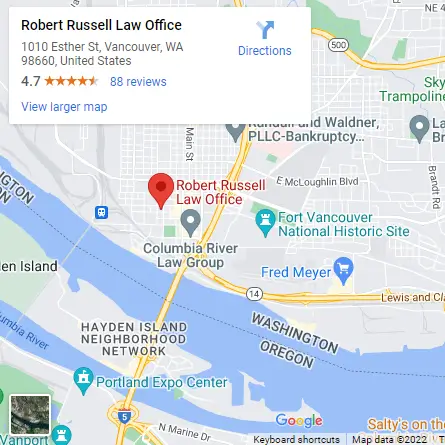Take Charge of your Future Healthcare Today!
Life is full of uncertainties, which is why it’s so important to plan for your future medical care, especially for situations when you may not be able to communicate your wishes. This is where an advance healthcare directive comes into play, and an advance healthcare directive attorney in Vancouver, WA can be your guiding hand.
Our estate planning attorneys at Robert Russell Law Office are here to assist people like you through the complicated process of creating an advance healthcare directive. We prioritize your values and preferences, providing a compassionate and client-focused service that helps you create a comprehensive plan. This gives both you and your loved ones peace of mind for the future.
Don’t let uncertainty cloud your future. Contact our Vancouver law firm today for free initial consultations by video or phone. Let’s work together to take charge of your healthcare planning in Vancouver, Washington.
What is an Advance Healthcare Directive?
An Advance Healthcare Directive, sometimes called a Living Will or Medical Directive, is a legal way to spell out your healthcare wishes if you’re ever unable to communicate them yourself. This document helps doctors, family members, and your appointed healthcare agent know and respect your medical preferences if you’re unable to make decisions.
Advance Healthcare Directives can cover a broad range of topics, including your choices for medical procedures, end-of-life care, organ donation, pain management, and other specific treatments. By outlining your values and beliefs in this document, you ensure your healthcare aligns with your personal preferences and ethical convictions.
These directives hold legal power as long as they meet necessary requirements and follow the laws in your area. Having an Advance Healthcare Directive means you stay in control of your medical decisions, even if illness, injury, or incapacity stops you from taking an active role in the decision-making process.
How Do Advance Healthcare Directives Work in Vancouver, Washington?
Here’s how Advance Healthcare Directives work in Vancouver, Washington:
- Legal Validity: In Washington, Advance Healthcare Directives are legally recognized as long as they meet state regulations. To be valid, the directives must be in writing and signed by the individual (known as the “principal”) or by someone else at the principal’s direction in their presence. The document should also be witnessed by two individuals who are not related to the principal and do not stand to inherit from the principal’s estate.
- Healthcare Preferences: An Advance Healthcare Directive allows you to express your healthcare preferences for different situations, including end-of-life care, life-sustaining treatments, pain management, and organ donation, among others. These preferences are unique to your values, beliefs, and medical conditions.
- Appointment of a Healthcare Agent: In Washington, you can select a trusted individual to act as your healthcare agent or proxy through the Durable Power of Attorney for Healthcare. This designated person then has the authority to make medical decisions on your behalf when you’re unable to do so. It’s crucial to select someone who truly understands and respects your values and wishes.
- Communication with Healthcare Providers: Healthcare providers in Vancouver, Washington, are required to follow the directions set out in the Advance Healthcare Directive. If you’re unable to voice your wishes, your healthcare agent or the written directive will guide the medical team in making decisions about your care.
- Informing Hospitals and Medical Facilities: You can register your Advance Healthcare Directive with the Washington State Registry or share copies with your healthcare providers and hospitals. Registering the document makes it easier for healthcare providers to access and respect your healthcare wishes.
- Regular Updates: It’s important to review and update your Advance Healthcare Directive regularly, especially when your health conditions or personal preferences change. Keeping the document current ensures your wishes accurately reflect your present circumstances.
- Document Accessibility: It’s crucial to ensure the right people know about and can access your Advance Healthcare Directive. This includes family members, your chosen healthcare agent, and healthcare providers. Easy access to the document supports prompt decision-making when necessary.
What are the Types of Advance Healthcare Directive?
The two primary types of Advance Healthcare Directives are:
- Living Will: This written document lets you specify your healthcare preferences and treatment choices ahead of time, particularly for situations when you’re unable to communicate due to incapacitation or terminal illness. It covers a wide array of medical scenarios and treatments, guiding healthcare providers and family to respect and follow your wishes.
- Durable Power of Attorney for Healthcare (Healthcare Proxy): This legal document lets you appoint a trusted individual, a healthcare agent or proxy, to make medical decisions for you if you become incapacitated. Unlike a Living Will, a Healthcare Proxy offers flexibility for decision-making based on your current medical situation and preferences, proving invaluable when faced with complex or unpredictable medical situations.
What are the Common Challenges in Implementing Advance Healthcare Directives?
Implementing Advance Healthcare Directives can sometimes encounter various challenges, mainly because these legal documents involve complex decisions and coordination between different parties. Common challenges include:
- Lack of Awareness: A lot of people are unfamiliar with Advance Healthcare Directives and their significance, leading to under-preparedness for future healthcare decisions.
- Procrastination: Given the sensitivity of healthcare planning, some may postpone creating an Advance Healthcare Directive, causing potential stress for family members.
- Family Disputes: Differences of opinion within families about medical treatments can lead to disagreements when putting the Advance Healthcare Directive into effect.
- Lack of Communication: If healthcare preferences aren’t effectively communicated to the appointed healthcare agent and family, it can cause uncertainty and complicate decision-making.
- Changing Healthcare Providers: Switching healthcare providers or relocating can present challenges in ensuring all relevant parties have the updated Advance Healthcare Directive.
- Legal Validity: If the Advance Healthcare Directive does not meet the specific legal requirements of the state, it may be deemed invalid or not fully enforceable, leading to uncertainties in the implementation of the individual’s preferences.
- Misunderstanding of Medical Terminology: Misinterpretation of medical terminology in Advance Healthcare Directives could lead to inappropriate medical decisions.
- Healthcare Provider Awareness: Not all healthcare providers may be aware of the existence of an individual’s Advance Healthcare Directive, leading to a lack of adherence to the documented preferences.
- Medical Advances and Changing Circumstances: Changes in health conditions or medical advancements can make previously outlined preferences outdated or irrelevant.
- Accessibility: In emergency situations, it might be challenging to access the Advance Healthcare Directive promptly, delaying critical decision-making processes.
Seeking legal advice from an advance healthcare directive attorney in Vancouver, WA can help ensure that the Advance Healthcare Directive is legally valid and effectively implemented according to your wishes.
What Should I Do to Overcome Obstacles and Ensure an Effective Healthcare Planning?
Overcoming obstacles and ensuring effective healthcare planning involves proactive measures and thoughtful consideration. Here are some strategies to address challenges and ensure a successful healthcare planning process:
- Start Early and Stay Informed: Begin the healthcare planning process early, well before any medical crisis arises. Stay informed about Advance Healthcare Directives, state laws, and the available options for expressing your healthcare preferences.
- Educate Yourself and Others: Learn about the benefits of Advance Healthcare Directives and the importance of discussing healthcare preferences with family members and healthcare agents. Educate your loved ones about your decisions to create a supportive environment.
- Seek Legal Guidance: Consult with experienced attorneys or healthcare professionals who can provide professional advice on creating comprehensive Advance Healthcare Directives that comply with state laws and align with your values.
- Communicate Clearly: Clearly express your healthcare preferences in plain language to avoid misunderstandings. Discuss your wishes with your appointed healthcare agent and ensure they understand their role in decision-making.
- Involve Your Healthcare Providers: Share a copy of your Advance Healthcare Directive with your primary healthcare providers and discuss your preferences with them. Ensure they are aware of your document and update them on any changes.
- Revise and Update Regularly: Review your Advance Healthcare Directive periodically, especially when significant life events occur or medical conditions change. Make necessary updates to ensure it reflects your current wishes accurately.
- Keep Copies Accessible: Store copies of your Advance Healthcare Directive in easily accessible places, such as with your healthcare agent, primary care physician, and family members. Consider registering your directive with the state’s Advance Directive Registry if available.
- Address Family Disagreements: If there are potential disagreements among family members, consider having open and honest discussions to reach a consensus or appointing a neutral mediator to facilitate communication.
- Discuss Advance Directives During Regular Checkups: During routine medical checkups, discuss your Advance Healthcare Directive and preferences with your healthcare providers. This ensures they are well-informed and can incorporate your preferences into your medical records.
- Review Medical Advances: Stay informed about medical advancements and how they might affect your healthcare decisions. Be prepared to revisit and update your Advance Healthcare Directive if necessary.
- Consider Cultural and Spiritual Beliefs: Take into account your cultural and spiritual beliefs when drafting your Advance Healthcare Directive to ensure it aligns with your values and personal beliefs.
- Stay Organized: Keep all relevant documents related to your healthcare planning, such as your Advance Healthcare Directive, medical records, and insurance information, organized and easily accessible.
By adopting these strategies, you can navigate potential obstacles and ensure that your healthcare planning is effective, providing you with peace of mind and ensuring that your healthcare preferences are respected and followed in the future.
Call our Advance Healthcare Directive Attorney in Vancouver, WA Now!
The importance of an Advance Healthcare Directive in Vancouver, Washington cannot be overstated. It empowers you to maintain control over your medical decisions, even in times of incapacity, ensuring that your values and preferences are respected and followed. By creating a comprehensive and legally valid Advance Healthcare Directive, you provide yourself and your loved ones with invaluable peace of mind.
It’s time to act. Contact the Robert Russell Law Office today for experienced guidance in healthcare planning. Our Advance Healthcare Directive Attorney in Vancouver, WA stands ready to assist you, ensuring your future is in capable hands. Reach out to our law office today for a free initial consultation via video or phone.
We also offer Vancouver, Washington the following services:



